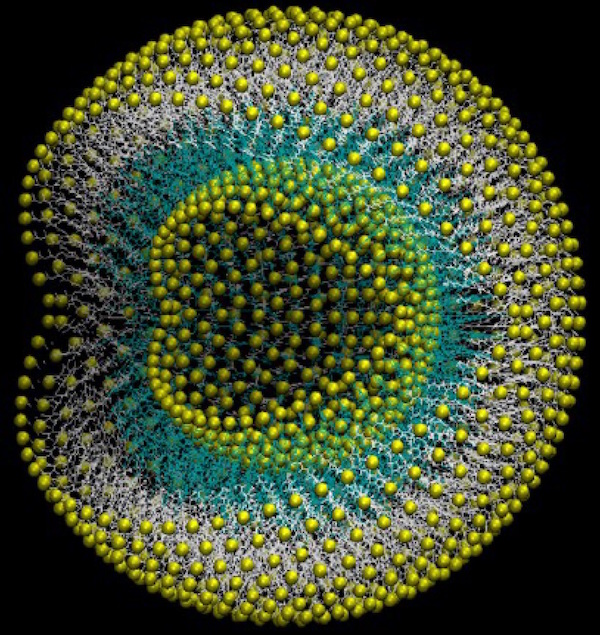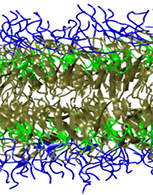Phoreus Biotechnology licenses Kansas State University bio-delivery technology
Tuesday, June 5, 2018
This computer-generated illustration shows the structure of Branched Amphiphilic Peptide Capsules, called BAPCs, developed at Kansas State University and licensed by Phoreus Biotechnology. The BAPCs are inert but can deliver active ingredients that kill pests and parasites or treat diseases.| Download this photo.
MANHATTAN — Phoreus Biotechnology, an Olathe-based company, has licensed a Kansas State University nanotechnology designed to deliver biomolecules that can improve vaccines and cancer therapies, boost the effectiveness of diagnostic imaging and control of pests, and control diseases and parasites in both animals and plants.
Branched Amphiphilic Peptide Capsules, known as BAPCs, are invisible and nontoxic to cells but can deliver active ingredients in a revolutionary way. John Tomich, professor of biochemistry and molecular biophysics, led an interdisciplinary team that developed BAPCs over the past eight years. The group has published 12 papers, including one in February, and obtained three patents during that time. Tomich said he has been amazed by the potential applications of BAPC.
"When we first made BAPC, nothing like it had previously existed; we were at ground zero in terms of understanding how it could be utilized," Tomich said. "We've been trailblazers in this area because it's such a novel material, and we have been able to control its size and decorate it with various things and help with enhancing biological activities."
Randall Tosh, a Kansas State University alumnus and chief executive officer of Phoreus Biotech, said the technology fills a significant need in a range of industries.
"Few discoveries have the capacity to change the global landscape of human, animal, plant and environmental health, but BAPC is one of those discoveries," Tosh said.
"University researchers and companies engaged in animal, plant, and human health care are in need of a quality delivery system for specific chemicals that can be delivered to unique cellular locations for gene therapies and vaccines," he said. "The current state-of-the-art depends on using delivery tools that may be toxic to critical cells. BAPCs are much more robust, versatile, and benign in their various applications."
Kansas State University researchers have already used BAPC to deliver targeted insecticides to tiny pests such as the red flour beetle and the pea aphid. This unique delivery technology accelerates research studies and opens new possibilities.
Because BPACs can be ingested in a powder or liquid form, Tomich said it makes working with insects — even the smallest ones — much easier.
Tosh said Phoreus is developing kits that will allow interested university and corporate researchers to test the capabilities of BAPCs and become acquainted with their versatility.
Tomich wanted to license the material to a Kansas company in an effort to create jobs. Phoreus will pursue research and sublicensing opportunities with other companies while it works to obtain regulatory approvals. The company has its corporate offices on the K-State Olathe campus to better facilitate ongoing research collaborations with the university. Phoreus expects to add three additional staff members in 2018 while also sponsoring a postdoctoral research position in the university's biochemistry and molecular biophysics department.
Peter Dorhout, vice president for research at Kansas State University, said Tomich's invention is an example of how basic research contributes to economic development.
"Innovations from Kansas State University researchers have provided the foundation for economic success in our state and region for more than 150 years, and technologies like BAPCs help us carry that legacy into the future by creating new jobs in emerging industries," Dorhout said.
"Universities work to license faculty and student-created inventions to companies to get the technology into the marketplace," said Chris Brandt, president of the Kansas State University Research Foundation. "Money invested in basic research is converted into product and services for the general public. It's part of K-State's mission to turn basic research into improvements that can drive economic growth."
Tosh said the partnership between Phoreus and Kansas State looks promising.
"We are very pleased to pursue commercialization of this valuable technology through partnership with the Kansas State University Research Foundation," Tosh said. "By 2022, the global market for our potential fields of use will approach $500 billion. Our success will be measured by both our development and market deployment of new products and by the extent to which we can successfully engage with research collaborators at K-State and beyond to generate further laboratory and commercial outcomes with our partners."


